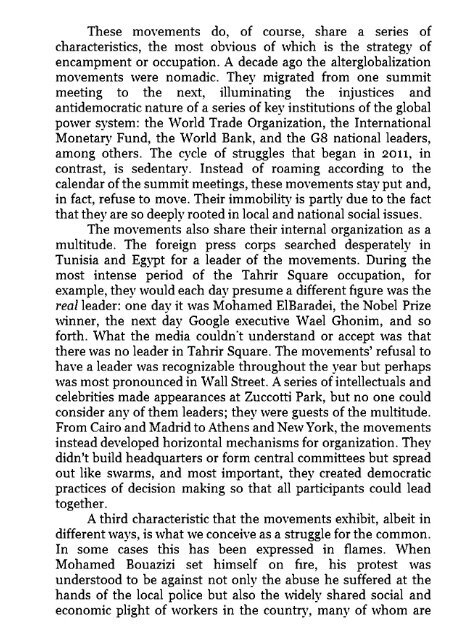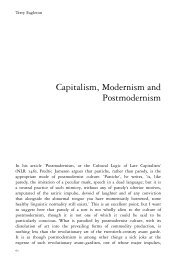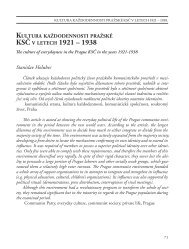Chapter 1: Subjective Figures of the Crisis ... - Negri in English
Chapter 1: Subjective Figures of the Crisis ... - Negri in English
Chapter 1: Subjective Figures of the Crisis ... - Negri in English
You also want an ePaper? Increase the reach of your titles
YUMPU automatically turns print PDFs into web optimized ePapers that Google loves.
These movements do, <strong>of</strong> course, share a series <strong>of</strong><br />
characteristics, <strong>the</strong> most obvious <strong>of</strong> which is <strong>the</strong> strategy <strong>of</strong><br />
encampment or occupation. A decade ago <strong>the</strong> alterglobalization<br />
movements were nomadic. They migrated from one summit<br />
meet<strong>in</strong>g to <strong>the</strong> next, illum<strong>in</strong>at<strong>in</strong>g <strong>the</strong> <strong>in</strong>justices and<br />
antidemocratic nature <strong>of</strong> a series <strong>of</strong> key <strong>in</strong>stitutions <strong>of</strong> <strong>the</strong> global<br />
power system: <strong>the</strong> World Trade Organization, <strong>the</strong> International<br />
Monetary Fund, <strong>the</strong> World Bank, and <strong>the</strong> G8 national leaders,<br />
among o<strong>the</strong>rs. The cycle <strong>of</strong> struggles that began <strong>in</strong> 2011, <strong>in</strong><br />
contrast, is sedentary. Instead <strong>of</strong> roam<strong>in</strong>g accord<strong>in</strong>g to <strong>the</strong><br />
calendar <strong>of</strong> <strong>the</strong> summit meet<strong>in</strong>gs, <strong>the</strong>se movements stay put and,<br />
<strong>in</strong> fact, refuse to move. Their immobility is partly due to <strong>the</strong> fact<br />
that <strong>the</strong>y are so deeply rooted <strong>in</strong> local and national social issues.<br />
The movements also share <strong>the</strong>ir <strong>in</strong>ternal organization as a<br />
multitude. The foreign press corps searched desperately <strong>in</strong><br />
Tunisia and Egypt for a leader <strong>of</strong> <strong>the</strong> movements. Dur<strong>in</strong>g <strong>the</strong><br />
most <strong>in</strong>tense period <strong>of</strong> <strong>the</strong> Tahrir Square occupation, for<br />
example, <strong>the</strong>y would each day presume a different figure was <strong>the</strong><br />
real leader: one day it was Mohamed ElBaradei, <strong>the</strong> Nobel Prize<br />
w<strong>in</strong>ner, <strong>the</strong> next day Google executive Wael Ghonim, and so<br />
forth. What <strong>the</strong> media couldn't understand or accept was that<br />
<strong>the</strong>re was no leader <strong>in</strong> Tahrir Square. The movements' refusal to<br />
have a leader was recognizable throughout <strong>the</strong> year but perhaps<br />
was most pronounced <strong>in</strong> Wall Street. A series <strong>of</strong> <strong>in</strong>tellectuals and<br />
celebrities made appearances at Zuccotti Park, but no one could<br />
consider any <strong>of</strong> <strong>the</strong>m leaders; <strong>the</strong>y were guests <strong>of</strong> <strong>the</strong> multitude.<br />
From Cairo and Madrid to A<strong>the</strong>ns and New York, <strong>the</strong> movements<br />
<strong>in</strong>stead developed horizontal mechanisms for organization. They<br />
didn't build headquarters or form central committees but spread<br />
out like swarms, and most important, <strong>the</strong>y created democratic<br />
practices <strong>of</strong> decision mak<strong>in</strong>g so that all participants could lead<br />
toge<strong>the</strong>r.<br />
A third characteristic that <strong>the</strong> movements exhibit, albeit <strong>in</strong><br />
different ways, is what we conceive as a struggle for <strong>the</strong> common.<br />
In some cases this has been expressed <strong>in</strong> flames. When<br />
Mohamed Bouazizi set himself on fire, his protest was<br />
understood to be aga<strong>in</strong>st not only <strong>the</strong> abuse he suffered at <strong>the</strong><br />
hands <strong>of</strong> <strong>the</strong> local police but also <strong>the</strong> widely shared social and<br />
economic plight <strong>of</strong> workers <strong>in</strong> <strong>the</strong> country, many <strong>of</strong> whom are










